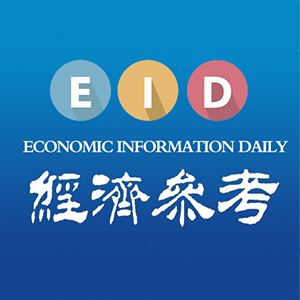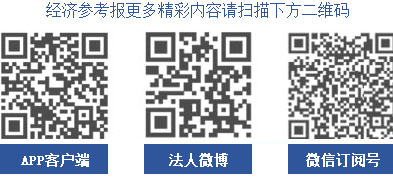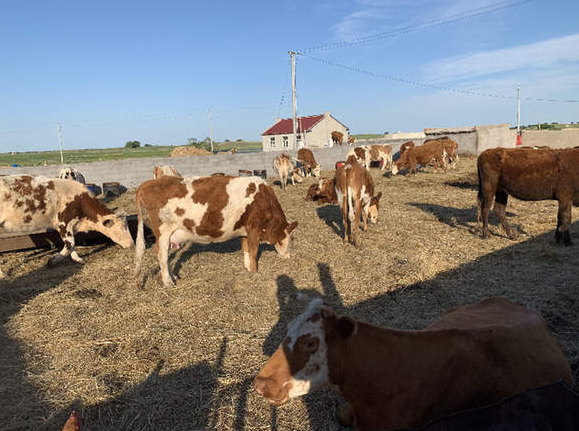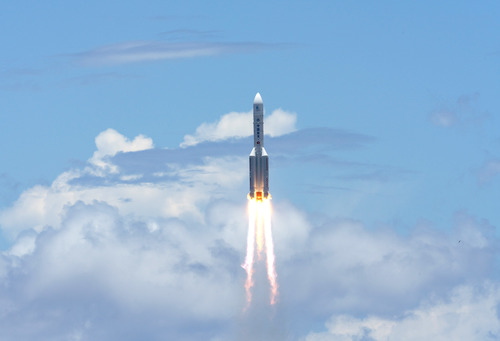2020年7月22日星期三美东时间5:01,《纽约时报》评论版发表北京首都医科大学校长饶毅评论文章:《新冠去世的叔叔和肺科医生的父亲》。
中文的8因其音似“发”而被视为幸运的数字、444似“死”为坏数字, 520 似“我爱你”。
向来讨厌迷信的我,非常难过地于5月20日下午4:44分收到微信:纽约皇后区的叔叔厚华(Eric)逝于新冠病毒,他74岁。
厚华是药剂师,很可能从取药的病人传来。三月感染后,他病了两个多月,曾用呼吸机,但最后十天被认为不可治愈后,呼吸机用于救助其他病人。
我家与医药关系不浅,我自己现在北京任职有19个附属医院的医科大学。我学医是因为我有肺科医生的父亲。父亲学医是因为他13岁时,他的母亲因简单的感染而去世。父亲没有预料到,比自己年轻15岁的弟弟逝于自己专科的疾病(呼吸系统疾病)。
父亲和厚华第一次分开是1947年。父亲那年17岁,留在江西南昌继续学业,两岁的厚华、其他弟弟和一个姐姐与其父母从上海渡台湾。
父亲在南昌完成医学教育、其后还在上海随最好的肺科医生获得研究生教育。但1960年代的文革使他下放到县城、最后到仅他一个医生的村庄。1972年,父亲到南昌一个主要医院工作。
1970年代中期,祖父经由斐济用一个信封含了两封信寄到父亲以前工作过的一个医院,外面那封信写:
敬启者:犬子饶纬华曾在贵院工作,后去农村,能否转此信给他。
里面那封是祖父致父亲的信。居然真转到了我父亲。那时我已十几岁,现在还记得祖父的用词和父亲读信时泪流满面的情形。
很快,厚华成为他们之间的主要信使。
厚华是我家第一位美国公民,他于1970年代后期到旧金山,被美国的发达所吸引,与他成长的台湾有天壤之别。
1982年,分离35年后的厚华与我父亲兄弟俩重逢。父亲在旧金山加州大学(UCSF)医学院心血管研究所进修一年,跟Norman Staub博士做肺水肿的动物实验,后在旧金山总医院随呼吸病和重症医学的权威John Murray博士见习临床和ICU数月。
回南昌后,父亲建立了全省第一个、全国较早的ICU之一。他还建立了分子医学研究所,是中国最早的之一、如果不是第一的话。
1985年,我跟随父亲和叔叔们(那时叔叔Tim/兴华也移民加州)的脚步,到UCSF念研究生。几年后我弟弟也赴美留学。
厚华从未返中国大陆。
至2005年他于75岁退休前,父亲治疗了很多呼吸病和ICU的病人。SARS在父亲退休前的2002-2003年发生,他预计SARS或类似的病毒还会发生。我和父亲还在争论此次新冠病毒算不算证明了其预计。
新冠病毒流行后,父亲经常给我寄如何治疗新冠肺炎的建议,让我转给其他医生,包括此次协调早些时候流行中心武汉抗疫的医学领袖。
我们家在武汉有12位亲戚、大部分是母亲家的,纽约有6位亲戚、大部分是父亲家的。在武汉的亲戚皆安然无恙,而纽约的厚华去世——去世于当今世界军事上最强大、经济上最富裕、医学上最先进的国家。
美国有两个月甚至更多时间可以汲取中国的新冠病毒流行经验,本可以做更多努力降低感染率和病死率。父亲很难接受弟弟去世的部分原因是认为自己就可以救助弟弟——厚华如果在中国也许就被治愈了。
在他一生大部分时间,父亲的家庭长期分离。如今,父亲和叔叔再度分离。(作者饶毅为中国北京首都医科大学校长、北京大学讲席教授、北京脑科学中心主任。)
《纽约时报》原稿摘录如下:
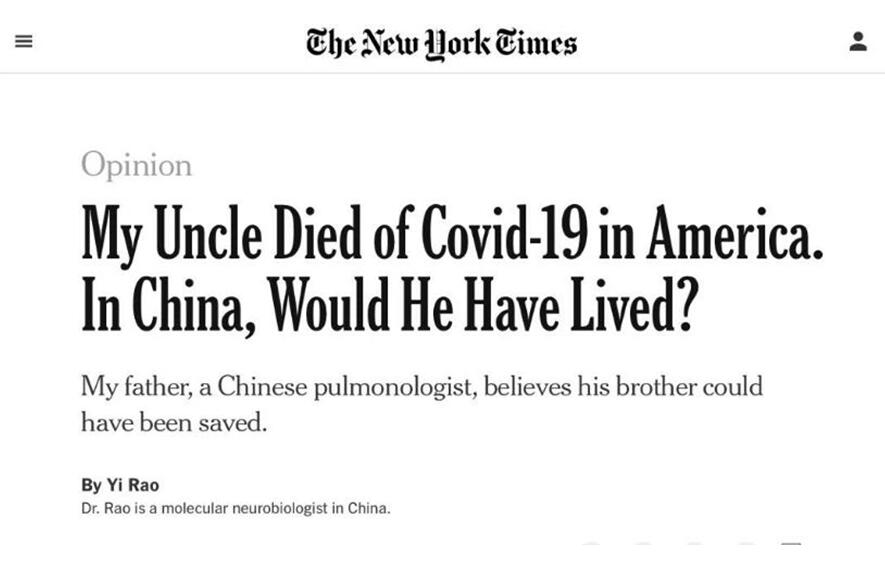
My Uncle Died of Covid-19 in America. In China, Would He
Have Lived?
My father, a Chinese pulmonologist, believes his brother could have been saved.
By Yi Rao
Dr. Rao is a molecular neurobiologist in China.
July 22, 2020, 5:01 a.m. ET
BEIJING — Eight is thought to be a lucky number in China because in Chinese it sounds like the word for “fortune”; 444 is a bad number because it rings like “death”; 520 sounds like “I love you.”
Having always disliked superstition, I was dismayed to receive a message by WeChat at 4:44 p.m. on May 20, Beijing time, informing me that my uncle Eric, who lived in New York, had died from Covid-19. He was 74.
Uncle Eric was a pharmacist, so presumably he contracted the virus from a patient who had visited his shop in Queens. Infected in March, he was sick for more than two months. He was kept on a ventilator until his last 10 days: By then, he was deemed incurable and the ventilator was redirected to other patients who might be saved.
The medical trade runs in my family. I now preside over a medical university in Beijing with 19 affiliated hospitals. I studied medicine because my father was a doctor, a pulmonary physician. He decided to study medicine after losing his mother to a minor infection when he was 13. My father did not expect to lose a brother 15 years his junior to a disease in his own specialty: the respiratory system.
My father (Weihua) and Eric (Houhua) were first separated in 1947. My father, then 17, stayed behind in Nanchang, the capital of Jiangxi Province, in central-southern China, to finish his education, while Eric, age 2, and other brothers and a sister sailed to Taiwan with their parents.
My father completed his medical education in Nanchang and had graduate training with one of the top respiratory physicians in Shanghai, but in the 1960s the Cultural Revolution then took him to a small town and after that to a village, where he was the sole doctor. He moved back to a major hospital in Nanchang in 1972.
In the mid-1970s, my grandfather sent him — by way of Fiji — a letter at a previous address, and miraculously it arrived.
Soon, Uncle Eric became their emissary.
Uncle Eric was the first member of my family to become an American citizen. He arrived in San Francisco in the late 1970s, drawn to an economic powerhouse of a country, so starkly different from what he had grown up with in Taiwan.
It was 35 years before the brothers met again, in 1982. My father was a visiting scholar for a year at the Cardiovascular Research Institute at the University of California, San Francisco, where he conducted research on pulmonary edema, and he received a few months of clinical training in the intensive care unit at what is now called the Zuckerberg San Francisco General Hospital and Trauma Center.
He brought his American training back to Nanchang to establish the first I.C.U. in Jiangxi Province and one of the first I.C.U.s in China. He also established one of the first — if not the very first — institute of molecular medicine in China.
In 1985, I followed in his footsteps and in those of my uncles — Uncle Tim (Xinghua) had immigrated to California as well: I went to San Francisco to study for my Ph.D., also at U.C.S.F. My younger brother moved to the United States a few years later.
Uncle Eric never returned to mainland China.
By the time my father retired in 2005, at 75, he had treated countless respiratory and I.C.U. patients in China. He had worked through the SARS epidemic in 2002-3, issuing dark predictions that the virus, or something like it, would come back. He and I debate whether the new coronavirus proves his prediction right.
As Covid-19 began to spread earlier this year, my father, now 90 and long retired, would send me advice about how to treat the disease so that I could relay it to other doctors, including the one leading response efforts in the city of Wuhan, the pandemic’s epicenter early on.
Our family has 12 members in Wuhan, mostly on my mother’s side, and six in New York, mostly on my father’s side. All my relatives in Wuhan are safe. Uncle Eric died in New York after the pandemic had moved to the United States — the world’s strongest country militarily, the richest economically and the most advanced medically.
The United States had two months or more to learn from China’s experience with this coronavirus, and it could have done much more to lower infection rates and fatalities. My father is struggling to accept his brother’s death partly, too, because he believes that he could have treated Uncle Eric — that in China Uncle Eric would have been saved.
My father’s family has been divided for most of his life, Now, my father and Uncle Eric have been separated once again.
Yi Rao is the president of Capital Medical University, a chair professor at Peking University and the director of the Chinese Institute for Brain Research, in Beijing.
